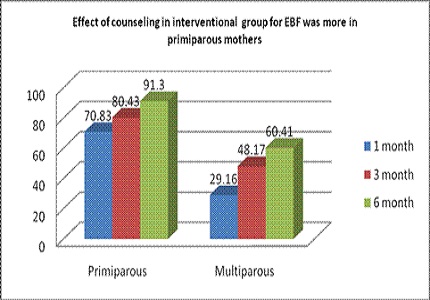Effect of educational intervention on breast feeding practices in tertiary care hospital, Gwalior Madhya Pradesh
Abstract
Introduction: Evaluation of the effectof educational intervention on early initiation of breast feeding in full term normally delivered baby 1 & 6 months andfactors affectingbreast feeding.
Methods: interventional study with subjects as mothers with vaginal delivered newborns excluding preterm, VLBW/ LBW / /IUGR babies, newborn with medical or surgical problems and whose child didn’t survive Cases were pregnant women attending antenatal clinic of KRH (n=124) and controls were mothers delivered at government hospital except KRH.(n=120). Mothers counseled antenatally and helped for initiation of breast feeding immediately after birth and again counseled individually at discharge, on follow up at end of1st and 6months. In control group breast feeding practices were recorded at 1 and 6 months after birth without any counseling.
Results: There were 76.8% (n = 80) mothers who had early initiation of breast feedingin interventional groupcompared to 10.56% (n = 12) in non-interventional group with odds ratio of32. 93 and 83%mothers in interventional group were practicing EBF (p = 0.01)against only 63 %, and 49% mothersat 1 and 6 months respectively in non-interventional group. Effect of counseling in cases for EBF was more in primiparous(70.83% and 91.30%) than in multiparous (29.16% and 60.41%) at 1 and 6 months respectively (p = 0.01and 0.04).
Conclusion: counseling antenatally and at regular intervals significantly increase early initiation and sustainedexclusive breast feeding. This influence primiparous mothers more.
Downloads
References
2. World Health Organization. Infant and Young ChildFeeding Counseling: A Training Course. The 3in 1 Course Integrated Course on Breastfeeding,Complementary Feeding and Infant Feeding & HIV.New Delhi: IBFAN Asia/BPNI; 2006. p. 26-1131.
3. Ministry of Health and Family Welfare National Family Health Survey-4 2015 -16, www.mohfw.nic.in
4. Tiwari satish, Ketan Bharadva, Balraj Yadav,et al. Infant and Young Child Feeding Guidelines. Indian journal of pediatrics.2016;53(8):703-713.
5. Patel S, Patel S. The effectiveness of breast feeding Consultants and Lactation Counselors on Breastfeeding Outcomes. SAGE Journals Volume: 32 issue: 3, page(s): 530-541.
6. Presentation on Annual Health Survey Fact Sheet Key Findings. New Delhi. Office of the Registrar General and Census Commissioner, Ministry of Home Affairs, Government of India; 2011.Availablefrom:http://www.censusindia.gov.i.n/2011,Common/AHSurvey.html. Accessed July 11, 2015.
7. Nath A. India's Progress Toward Achieving the Millennium Development Goals. Indian J Community Med. 2011 Apr;36(2):85-92. doi: 10.4103/0970-0218.84118.
8. Gupta A. Infant and young child feeding an ‘optimal approach. Econ Polit Wkly. 2006;XLI(34):3666-71.
9. Dennis CL, Hodnett E, Gallop R, Chalmers B. The effect of peersupport on breast-feedingduration among primiparouswomen: a randomized controlled trial. CMAJ. 2002 Jan
8;166(1):21-8. [PubMed]
10. Perez-Escamilla R, Segura-Millán S, Pollitt E, Dewey KG. Effect of the maternitywardsystem on the lactationsuccess of low-incomeurbanMexicanwomen. Early Hum Dev. 1992 Nov;31(1):25-40. [PubMed]
11. Ramesh Choudhary, Chetan Meena, Sunil Gothwal, et al, Effect of lactation counselling on breast feeding: randomized control trial, vol14,No 5(2017).
12. Holmes GE, Hassanein KM, Miller HC. Factorsassociated with infections among breast-fedbabies and babiesfedproprietarymilks. Pediatrics. 1983 Sep;72(3):300-6.
13. Ekström A, Widström AM, Nissen E. Duration of breastfeeding in Swedish primiparous and multiparous women. J Hum Lact. 2003 May;19(2):172-8. [PubMed]

Copyright (c) 2018 Author (s). Published by Siddharth Health Research and Social Welfare Society

This work is licensed under a Creative Commons Attribution 4.0 International License.


 OAI - Open Archives Initiative
OAI - Open Archives Initiative


